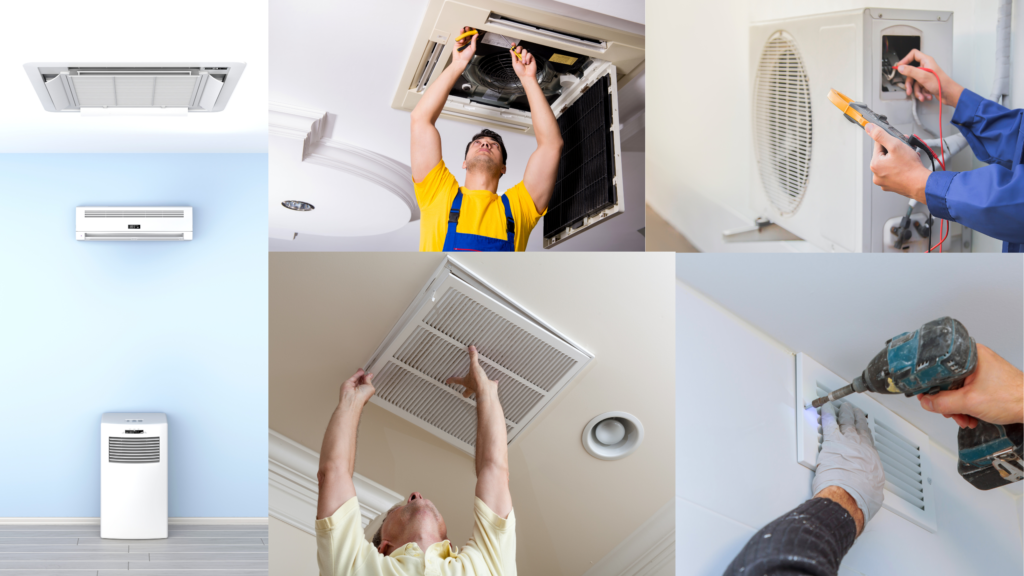
Understanding
HVAC: A Beginner’s Guide to Heating, Ventilation, and Air Conditioning
In today’s modern world, ensuring comfort within indoor spaces has become a priority, especially in a country like India where extreme weather conditions are common. Whether it’s the sweltering heat of summer or the biting cold of winter, HVAC systems play a crucial role in maintaining a comfortable environment in homes, offices, and commercial spaces. But what exactly is HVAC, and why is it so important? Let’s dive into the basics.
What is HVAC?
HVAC stands for Heating, Ventilation, and Air Conditioning. It is an all-encompassing term that refers to the different systems used for moving air between indoor and outdoor areas, along with heating and cooling both residential and commercial buildings. HVAC systems are designed to maintain comfortable indoor temperatures, ensure good air quality, and manage humidity levels.
Components of HVAC Systems
1. Heating: The heating component is designed to provide warmth during the colder months. This is typically done through a furnace or heat pump. The system works by generating heat and distributing it through the building via a network of ducts.
2. Ventilation: Ventilation is crucial for ensuring that the air inside your home or building is fresh and free of contaminants. There are two main types of ventilation: natural and mechanical. Natural ventilation uses openings like windows and doors, while mechanical ventilation involves fans and ducts to circulate air and remove pollutants.
3. Air Conditioning: The cooling aspect of HVAC systems is what most people are familiar with. Air conditioners remove heat from indoor spaces, providing a cooling effect. They work by drawing warm air out of the building, cooling it, and then circulating it back indoors.
Why is HVAC Important?
1. Comfort: The primary purpose of an HVAC system is to create a comfortable environment, regardless of the weather outside. A well-functioning HVAC system keeps your indoor spaces warm in winter, cool in summer, and ensures proper ventilation all year round.
2. Air Quality: Indoor air quality is a significant concern, especially in urban areas where pollution levels can be high. HVAC systems help filter and purify the air, reducing allergens, dust, and pollutants. This is particularly important for people with respiratory conditions or allergies.
3. Energy Efficiency: Modern HVAC systems are designed to be energy-efficient, which can significantly reduce your energy bills. By maintaining consistent indoor temperatures and minimizing energy waste, these systems not only save money but also reduce your carbon footprint.
4. Humidity Control: In a tropical climate like India’s, managing humidity levels is crucial for both comfort and health. HVAC systems help maintain optimal humidity levels, preventing issues like mold growth, which can be harmful to both health and property.
Choosing the Right HVAC System
Selecting the right HVAC system for your space can be daunting, especially with the myriad of options available in the market. Here are a few factors to consider:
1. Size of the Space: The size of your home or building will determine the type and capacity of the HVAC system you need. An undersized system may struggle to maintain the desired temperature, while an oversized system can lead to energy wastage.
2. Energy Efficiency: Look for systems with high energy efficiency ratings. Although they might have a higher upfront cost, they will save you money in the long run through reduced energy bills.
3. Climate: The climate in your area plays a significant role in determining the right HVAC system. For instance, if you live in an area with hot summers and mild winters, you might prioritize a robust air conditioning system.
4. Maintenance: Regular maintenance is key to ensuring the longevity and efficiency of your HVAC system. Consider systems that are easy to maintain and have a good track record for durability.
Maintenance Tips for Your HVAC System
1. Regular Inspections: Schedule regular inspections to catch any potential issues early. This can prevent costly repairs down the line.
2. Clean Filters: Air filters should be cleaned or replaced regularly to ensure optimal performance and air quality.
3. Check for Leaks: Inspect ducts and pipes for any leaks that could reduce efficiency and lead to higher energy bills.
4. Professional Servicing: It’s advisable to have your HVAC system serviced by a professional at least once a year to ensure everything is functioning correctly.
Why Choose Alviz Electro India Pvt. Ltd.?
At Alviz Electro India Pvt. Ltd., we specialize in providing top-notch HVAC solutions tailored to meet the specific needs of our clients. With years of experience in the industry, our team of experts is committed to ensuring your spaces are comfortable, energy-efficient, and equipped with the best air quality possible. Whether you need a new installation, regular maintenance, or an upgrade to your existing system, we have the expertise to deliver exceptional results.
Conclusion
Understanding the basics of HVAC systems is essential for making informed decisions about your indoor comfort. By choosing the right system and maintaining it properly, you can enjoy a comfortable, healthy, and energy-efficient environment all year round. At Alviz Electro India Pvt. Ltd., we’re here to guide you every step of the way, ensuring that your HVAC needs are met with the highest standards of quality and service.
Disclaimer:
The blog posts on alviz.in are for informational purposes only. While we aim for accuracy, the content may not reflect the latest updates or specific advice. Alviz Electro India Pvt. Ltd. is not responsible for actions taken based on this information. For expert guidance, please contact us.